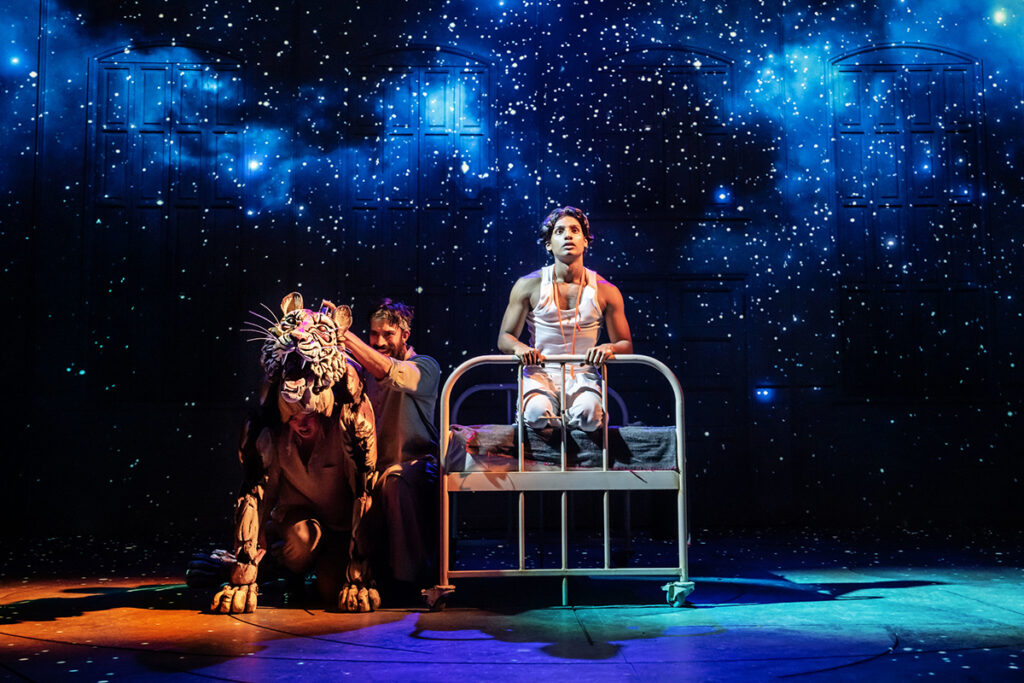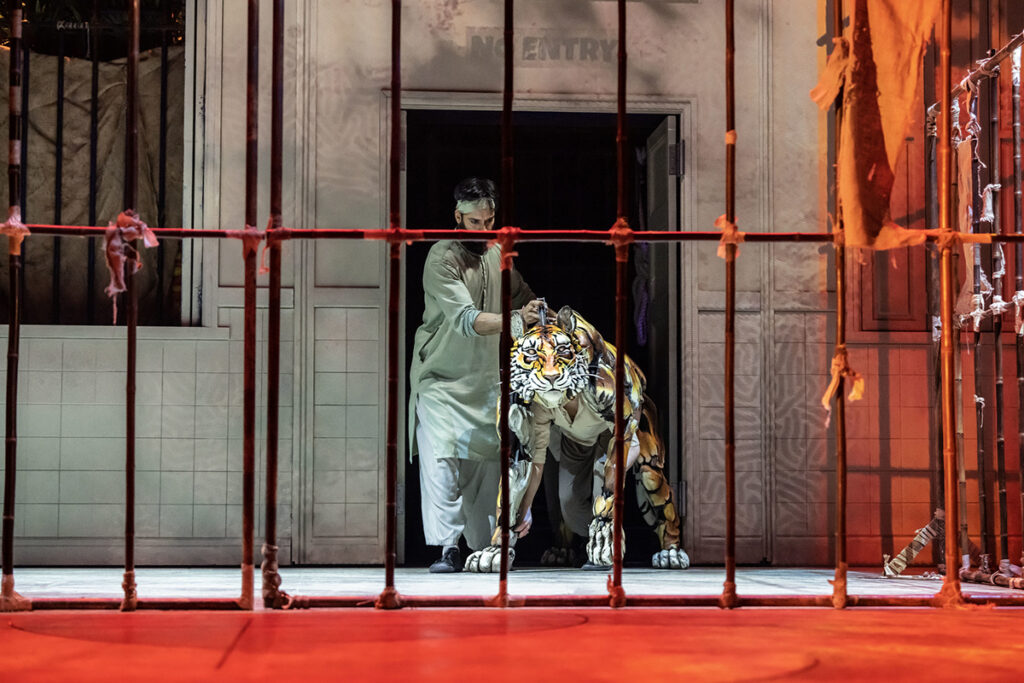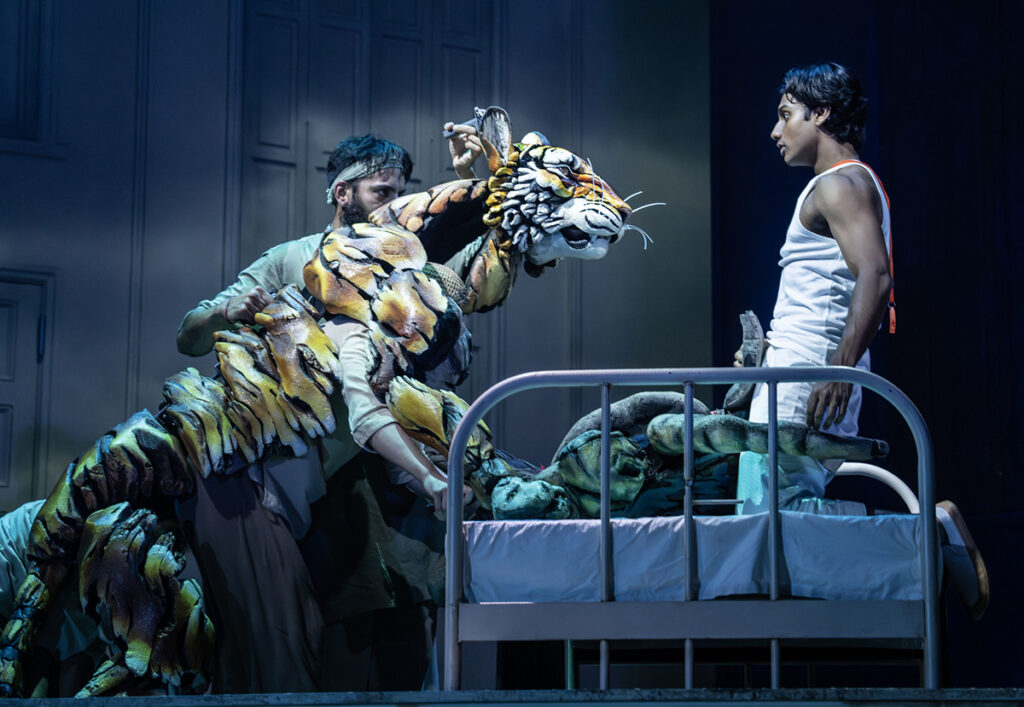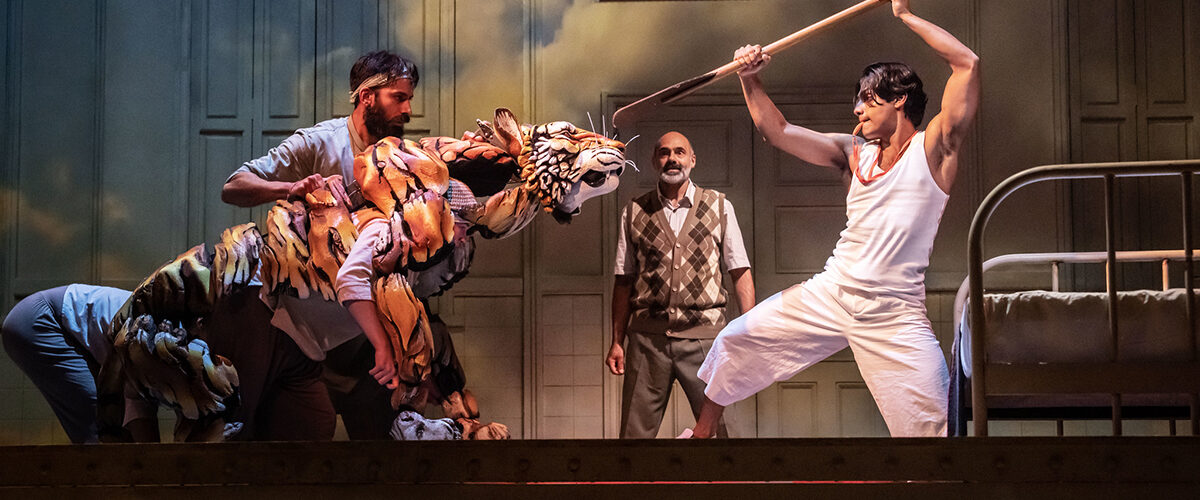What happened to 3D films? There was a time when nearly every big movie came in two versions. But much in the manner of My Space, 3D disappeared almost overnight; indicative of how dispensable it was in the eyes of film fans (there is still the occasional, random 3D release, like the boring Avatar sequel). The only film genuinely enhanced by the format was Ang Lee’s Oscar garlanded Life of Pi, based on the bestseller by Yann Martel, and released in 2016. It took an artist like Lee to see the true potential of the format. Life of Pi (3D version) is a work of genuine, immersive beauty.
With that in mind, a stage version of Martel’s Booker Prize Winning novel would appear a natural progression. Sheffield Theatre’s production – in an adaptation by actress and playwright Lolita Chakrabarti – has been garlanded with awards since premiering in 2019 (and earlier this year, it opened on Broadway).

Life is divided into two distinct halves. In Act 1 we are introduced to Pi and his family, who own a small zoo in Pondicherry, India. Raised as Hindu, and a practicing vegetarian, the 14-year-old, ever curious Pi, investigates Christianity and Islam, and decides to become an adherent of all three – much to his parents’ dismay. Pi’s father teaches his children an important lesson: life is hard and sometimes we need to behave like animals, because it takes brutality to survive. A savagery clearly embodied in the zoo’s newest inhabitant, a fearsome Bengal Tiger called, Richard Parker (so called because of an admin error on the transfer docket).
In 1976, Indian PM Indira Gandhi declared a nationwide emergency, creating a state of social unrest which caused many to flee the country. Pi’s father decides to sell the zoo, and move everyone, animals included, to Canada. Passage is booked on a cargo ship, but tragedy soon strikes. During a violent storm, the ship sinks, and most of the passengers drown. Pi is the sole survivor, alone in a lifeboat, with four unexpected companions: a Zebra, Hyena, Orangutan, and the aforementioned, Richard Parker.

Yann Martel had one note to Chakrabarti for her adaptation; the animals need to be dangerous. Life isn’t a show for young children, and there is no attempt to anthropomorphise the creatures. The animals attack each other, and in one scene, we witness the Hyena violently chewing on the Zebra’s innards. The puppets themselves are things of wonder, complex, magical, and filled with character; hats off to Finn Caldwell and Nick Barnes for their work here (Caldwell is also credited as movement director).
Puppeteers perhaps don’t get enough credit; the team of Antony Antunes, Sebastian Goffin, Akash Heer, Romina Hytten, Katie Kennedy-Rose, Kate Rowsell, Peter Twose and Aizah Khan operate the Tiger head and body with sublime technique. But Life is one of those shows which dazzles on pretty much every level; the lighting design of Tim Lutkin and Tim Deiling adds rich, jaw dropping perspective during the ocean section. Composer Andrew T Mackay’s music is melodically gorgeous, something I could happily listen to at home.
The character of Pi is on stage throughout, and drives the entire show. ‘Understudy’ – like the word ‘amateur’ – is a word that has always carried a certain baggage, as though the second actor, patiently waiting in the wings, is somehow a lesser talent. Now it’s mostly banished, in favour of the more pleasing ‘alternate.’ Tonight, the role of Pi belongs to alternate Tanvi Virmani, and she is effortlessly up to the challenge – a winning combination of feistiness and vulnerability. The latter quality is readily apparent in the scenes where Pi is forced to abandon the principles of vegetarianism, and kill and eat a sea turtle (quietly heartbreaking to watch).

Life of Pi grips because it’s an adventure tale unlike anything else. Martel’s musings on God and religion are perhaps a case of preaching to the converted; those with a strong belief system will more than likely lap this up, whilst atheists will find these stretches plodding and tiresome. Which is not to diminish the transcendent flourishes conjured up by director Max Webster: Pi and Richard Parker, floating on a placid sea, and guided by the night stars, is an image which melts into the mind. And a moment that might give agnostics food for thought, as it evokes something almost holy.
One of the best productions I’ve seen in a long time, Life of Pi is unmissable theatre.
Life of Pi is at The Lowry, Salford from 5 December 2023 to 7 January 2024.





